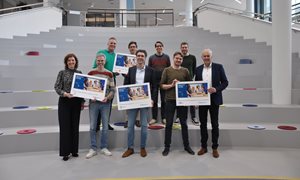
The universities united in the African Research Universities Alliance (ARUA) and the Guild of European Research-Intensive Universities (The Guild) are starting 17 research clusters aimed at changing the nature of African-European research collaboration. These clusters emphasise equality as a prerequisite for excellent and impactful research. One such research cluster, in the field of infectious diseases, immunity and inflammation, is led on the European side by Radboud university medical center. The intention is also that non-medical disciplines of Radboud University make a contribution to the partnership.
The Africa-Europe Clusters of Research Excellence (CoRE) bring together leading researchers from universities and research institutes from both continents: both members of ARUA and The Guild, and participants from outside the two networks. Each cluster focuses on a key societal challenge and is committed to guaranteeing maximum scientific and societal impact.
One of the research clusters currently being launched under the Public Health theme is called Translational Research in Infection, Immunity, and Inflammation, and is led on the European side of the partnership by Radboud university medical center. On the African side, the project is in the hands of Makerere University in Kampala, Uganda.
Global health once again in the spotlight
The project's coordinator is Quirijn de Mast, internist and infectious disease expert at Radboud university medical center. De Mast specialises in tropical infectious diseases. He is delighted with the new research initiative, which he says fits in perfectly with the links Radboud university medical center has built with Africa for decades. “For example, we’ve worked intensively with Tanzania since the mid-1960s, primarily through joint research on infectious diseases such as TB, malaria, and HIV. And yet, I welcome the additional boost, because global health is once again fully in the spotlight, especially since the pandemic. If COVID-19 made anything clear, it is that the world is a global village and diseases can spread around the world with great ease and speed, despite draconian measures. And there is more trouble heading our way: antimicrobial resistance is a global problem, and the climate crisis also impacts health – for example through the further spreading of mosquito-borne infectious diseases and growing water and food insecurity. Plus, Africa is also rapidly falling prey to diseases of affluence such as obesity, diabetes, and cardiovascular disease. In this context, it is not surprising that the Dutch government recently felt compelled to formulate a Global Health strategy, and other countries are following suit.”
More than a statement of intent
De Mast sees the collaboration within the Africa-Europe Clusters of Research Excellence (CoRE) as more than a statement of intent. “There is real commitment to act jointly (for an overview of participating institutes, see the box and map below, Eds.), and also over a longer period of time. One of the agreements, for example, is that we will train young researchers and make sure that they are embedded in global scientific networks. Another important aspect is the exchange of knowledge and expertise between the participating African partners.”
There is as yet no concrete funding for the new research clusters, but that is obviously something the partners are working on together. Also, further work is needed in areas such as technology exchange.
Capacity Exchange
“To be clear, this is not a one-way flow of European knowledge to Africa. When it comes to global health, we have a lot to learn from Africa. This project is therefore not about capacity building, in my opinion, but about capacity exchange. For example, I am personally doing research with Mihai Netea and other colleagues on the influence of what people eat on their immune system. Traditional African diets are disappearing fast, but they include products that are very interesting and that can help us learn about the impact on the immune system.”
In addition to immunology and inflammation, the Translational Research in Infection, Immunity, and Inflammation research cluster will be working on topics such as antimicrobial resistance and HIV. “Always from a translational perspective, i.e. with a direct translation to humans.”
Collaboration with other disciplines is also high on the agenda. “We would like to involve other researchers and other Radboud University faculties in this research cluster. Given the complexity of global health issues, an interdisciplinary approach is essential.”
Radboud University medical centre is the European lead for the research cluster Translational Research in Infection, Immunity, and Inflammation and is also involved in three other research clusters as a core partner: Advanced Infectious Diseases Research and Training, Genomics for Health in Africa, and Water Resources Management for a Sustainable and Just Future.
Who is in the research cluster?
In addition to the leads, Radboud university medical center and Makerere University, the Translational Research in Infection, Immunity, and Inflammation research cluster involves the following core partners: Ghent University (Belgium), the University of Ghana, the University of Rwanda, Addis Ababa University (Ethiopia), and Muhimbili University (Tanzania). Other partners include Erasmus University Medical Centre (the Netherlands), Kwame Nkrumah University of Science and Technology (Ghana), and Kilimanjaro Christian Medical University College (Tanzania).




